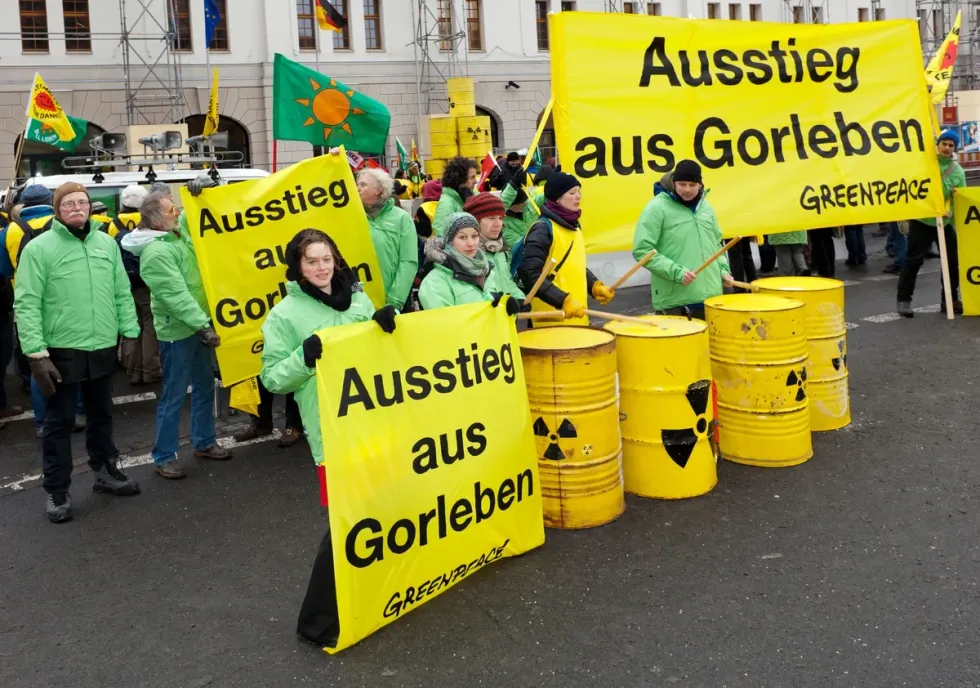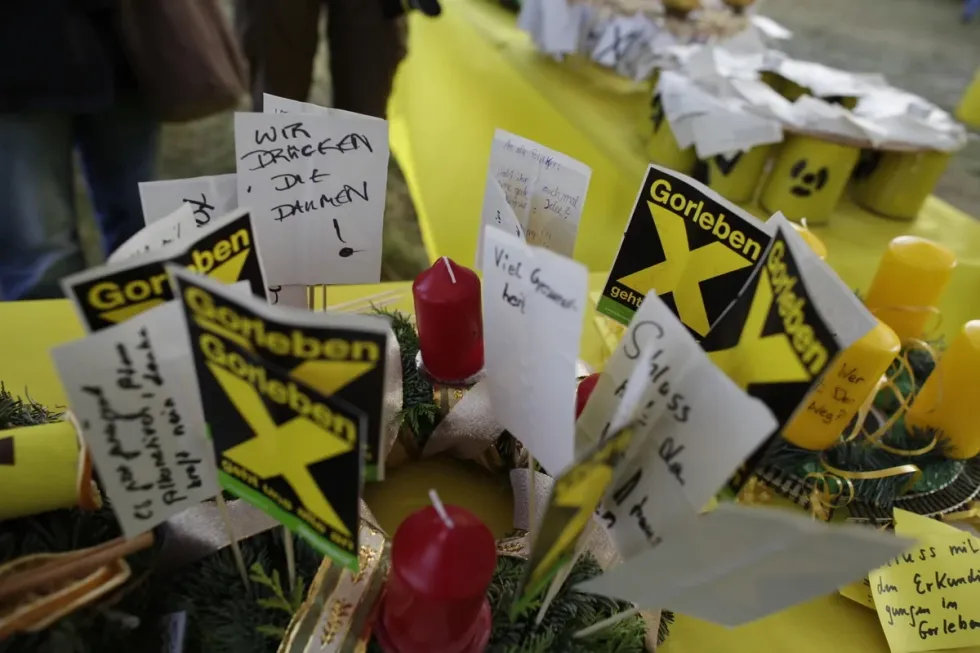

SUBSCRIBE TO OUR FREE NEWSLETTER
Daily news & progressive opinion—funded by the people, not the corporations—delivered straight to your inbox.
5
#000000
#FFFFFF
To donate by check, phone, or other method, see our More Ways to Give page.


Daily news & progressive opinion—funded by the people, not the corporations—delivered straight to your inbox.
'It is time for the international community to step in and call out this clear breach of the international law'
South Koreans have continued a weekend rally against Japan's dumping of Fukushima nuclear plant's contaminated radioactive wastewater into the ocean by holding a large demonstration on Saturday.
The protesters, including fishermen, activists and politicians, shouted slogans such as "Immediately stop the marine dumping of radioactive wastewater" and "Prohibit import of all Japanese aquatic products," as they urged the South Korean government to file a lawsuit with the International Tribunal for the Law of the Sea against the Japanese government.
On August 24th, Japan began dumping radioactive water from the crippled Fukushima Daiichi nuclear power plant into the Pacific Ocean.
The move resulted in a massive backlash across Asia and around the world.
While South Korea's opposition Democratic Party leader Lee Jae-myung calls the Fukushima release an "act of terror," the country's government under President Yoon Suk Yeol has backed Japan's decision, Deutsche Welle explained. However, the release is unpopular with the public, with more than 80% opposing the release and more than 60% vowing not to eat Japanese seafood afterward, The Associated Press reported.
According to The Korea Herald:
Democratic Party of Korea head Rep. Lee Jae-myung, on the fourth day of a hunger strike, said he would call on the international community to join his party’s protests against the Japanese government over the water’s release, in a press conference on Sunday.
“The dumping of the wastewater contaminated with radioactive materials by Japan is in direct violation of the London Convention on marine pollution,” he said. “It is time for the international community to step in and call out this clear breach of the international law, stop Japan’s misbehavior and stand united to preserve marine safety.”
The main opposition leader said he penned a letter to the heads of states and governments of the 86 signatories of the London Convention to collectively rally against the release of the Fukushima wastewater.
Xinhua news reports:
"Fukushima nuclear-contaminated wastewater has the nature of trash," Lee Seo-yoon, a mother of three children, said during the rally, adding that Japan regards the ocean as the largest and the cheapest trash bag.
Lee stressed that it would be absurd to hope that no one would be harmed after dumping the trash into the ocean, urging Tokyo to store the radioactive wastewater on its soil rather than dumping it in the sea.
"The ocean is the future of my family and the future of our descendants," said Kim Sam-ho, a fisherman who came from the country's southern coastal Wando County.
Kim raised his strong doubts about the safety of the radioactive wastewater, calling for the South Korean government to take necessary actions including supporting measures for fishermen.
"The major purpose of nuclear safety is to block radiation from reaching the environment and people," said Han Byung-sub, a nuclear expert who had worked at the Korea Atomic Energy Research Institute (KAERI) and the Korea Electric Power Corp. Engineering & Construction (KEPCO E&C).
Han noted that the proper measurement of radiation from Fukushima, involving groundwater flowing in and out of the destroyed reactor, was not carried out, urging the South Korean government to properly measure the radiation in waters off the country from now on.
Following the one-and-a-half-hour rally, the protesters marched about five km in downtown Seoul to the presidential office.
In response, China said it would ban the import of all Japanese ocean products, with one ministry spokesperson calling Japan's decision "selfish."
At around 1:00 pm local time Thursday, the Tokyo Electric Power Company began to discharge wastewater from the Fukushima nuclear plant, in keeping with the schedule Japan announced Tuesday.
In response, South Korean protestors attempted to enter the Japanese Embassy in Seoul, and China said it would ban the import of all Japanese ocean products.
"The ocean is the common property of all humankind, not a place for Japan to arbitrarily dump nuclear-contaminated water," Chinese foreign ministry spokesperson Wang Wenbin said ahead of the first release of water Thursday, as The Guardian reported.
Wang also called the decision "extremely selfish."
"The sea is not Japan's trash bin."
The Chinese customs agency said it would immediately and "completely suspend the import of aquatic products originating in Japan" to "prevent the risk of radioactive contamination of food safety." This means that, in addition to seafood, marine products like seaweed or sea salt would also be covered, CNN explained.
In South Korea, around 50 people gathered for a protest outside the Japanese Embassy in Seoul, Reuters reported. A group of them entered the building and reached the eighth floor, where they unfurled banners.
"The sea is not Japan's trash bin," one banner read. "Stop releasing contaminated water at once."
Police arrested 16 people for trespassing, physically carrying and dragging some out of the building and on to a bus, a Reuters photographer said.
While South Korea's opposition Democratic Party leader Lee Jae-myung calls the Fukushima release an "act of terror," the country's government under President Yoon Suk Yeol has backed Japan's decision, Deutsche Welle explained. However, the release is unpopular with the public, with more than 80% opposing the release and more than 60% vowing not to eat Japanese seafood afterward, The Associated Press reported. This has prompted the government to threaten Japan with a lawsuit if radiation levels surpass the safety limit, according to DW.
"I totally oppose the Japanese plan. The radioactive wastewater is truly a bad thing," Seoul resident Lee Jae-kyung told AP. "My feelings toward Japan have worsened because of the wastewater release."
The governments of Hong Kong and Macao have also placed a more limited ban on seafood from 10 Japanese prefectures including Fukushima. Hong Kong chief executive John Lee called Japan's decision to release the water "irresponsible," according to The Guardian. There, the release also drew protests, with demonstrators ripping up a sign with the Japanese flag and the words, "No trace of humanity. An enemy of the whole world," when they reached the consulate, as AP reported.
Domestically, too, the release has prompted opposition from fishers and environmental groups, as well as concern from citizens.
"I'm not going to buy fish from Fukushima again and I will ask the sushi restaurant where I usually go where they are buying their stocks from. And I definitely will not go to any of the beaches there with my children until I am absolutely sure that it is safe again," Kanako Hosomura, who lives less than 200 kilometers from the plant, told DW.
Around 400 protesters gathered outside the Tokyo Electric Power Company (TEPCO) headquarters Thursday morning, Greenpeace Japan tweeted.
The protests continued even after the release began.
Japan insists that its plan for the release is safe, and the International Atomic Energy Agency has concluded it is "consistent with relevant international safety standards." TEPCO is first treating the water in an advanced liquid processing system to remove everything except for the radioactive tritium, which is not possible to remove because it is an isotope of hydrogen, a key component of water, as NPR explained. The water containing the tritium is then further diluted with seawater to one-seventh of the World Health Organization's safety standard, according to DW. The government says some nuclear plants release tritium-contaminated wastewater at higher levels, NPR reported. And The Guardian observed that Chinese plants also release wastewater into the ocean.
TEPCO said it would release 7,800 tons of water over the next 17 days, and around 31,200 tons by April, according to DW. The entire process is expected to take around three decades.
Edwin Lyman, the director of nuclear power safety at the Union of Concerned Scientists in Washington, D.C., told NPR that Japan's plan was "the least bad of a bunch of bad options."
"The idea of deliberately discharging hazardous substances into the environment, into the ocean is repugnant," Lyman said. "But unfortunately, if you do look at it from the technical perspective, it's hard to argue that the impacts of this discharge would be worse than those that are occurring at nuclear power plants that are operating worldwide."
However, Woods Hole Oceanographic Institute senior scientist Ken Buesseler said it would be better to keep the waste stored on land where it could be watched.
While he didn't think the waste posed a threat to the wider Pacific, "nearshore in Japan could be affected in the long term because of accumulation of non-tritium forms of radioactivity," Buesseler told NPR.
The German nuclear phase-out is a victory of reason over the lust for profit; over powerful corporations and their client politicians.
Millions of people worked towards this day for years. People who protested against reprocessing plants, nuclear waste transport, unsafe nuclear waste storage facilities, and the construction of new nuclear power plants. Those decades of resistance were worth it.
The German nuclear phase-out is a victory of reason over the lust for profit; over powerful corporations and their client politicians. It is a people-powered success against all the odds.
I thank all the brave people who took risks for their beliefs; everyone who took part in demonstrations; all the people who signed petitions and sent letters of protest. And I'm proud of the role Greenpeace has played in opposing high-risk nuclear technology.

In the current debate about the last remaining nuclear power plants in Germany, it is often forgotten how big the movement against nuclear plants was in this country, even before the catastrophic events at Chornobyl and Fukushima.
The construction of the planned reprocessing plant in Wackersdorf was stopped in 1989 after years of widespread protest, a first major success of the anti-nuclear movement, with which Greenpeace is inextricably linked.

Greenpeace: protest and research
Greenpeace has repeatedly protested against the transport of nuclear waste from German nuclear power plants to the reprocessing plants in Sellafield (England) and La Hague (France) and was also able to prove that these plants are anything but harmless.
Greenpeace measurements from 1998 showed that soil samples from the vicinity of the Sellafield nuclear plant were comparable to radioactively contaminated samples taken from the 30-kilometer exclusion zone around the Chornobyl reactor.
At the turn of the century, in the North Sea off La Hague we found radiation levels well above regulatory limits, revealing routine illegal discharges of radioactive wastewater.
In 2005, shipments to so-called nuclear fuel recycling plants in England and France from Germany were banned. This is also a success of Greenpeace, of protest based on facts.
The latest major milestone of the anti-nuclear movement, here in Germany, was the decision against the Gorleben repository. Once again, the nuclear industry and their political apologists were unable to oppose or overwrite the science: The dilapidated salt dome is demonstrably unsuitable for storing radioactive waste, which must be kept safe for hundreds of thousands of years.

At the same time, the success points to the huge problem that advocates of nuclear power want to pass on to future generations: There is not one single safe repository for nuclear waste anywhere in the world. It is also good that Germany will not produce any new nuclear waste after April 16.
Nuclear power is not only risky, but also not a solution to the energy crisis. Before the anniversary of the Fukushima disaster, Greenpeace activists are calling for the German nuclear power plants to be finally switched off.
The accidents in Chornobyl and Fukushima have shown us in the most emphatic way that this technology cannot be controlled by humans in the event of a disaster. The German federal government's decision in 2011 to shut down nuclear power plants was correct at the time, and it still is.
Nuclear energy is expensive, risky, and far from independent: More than half of the uranium traded worldwide comes from Russia, Kazakhstan, and Uzbekistan. With resources no longer squandered on the false promise of nuclear energy, following its removal from the energy mix, the renewable energy transition can finally pick up speed. I look forward to a safe and secure future with renewable energies, without fear of the next nuclear accident and misguided investments in error-prone and outdated technology.
Today I celebrate the nuclear phase-out and the many people who made it possible.
This story was originally posted by Greenpeace Germany.